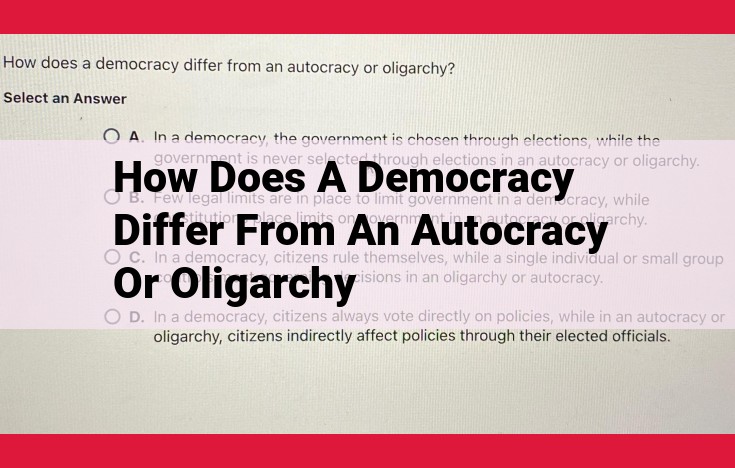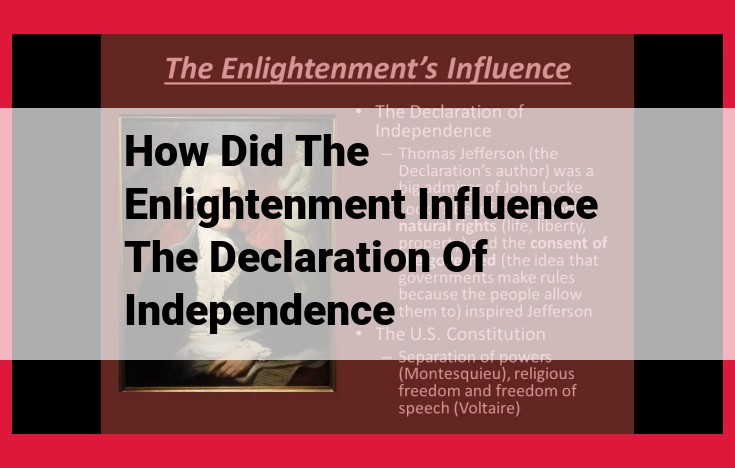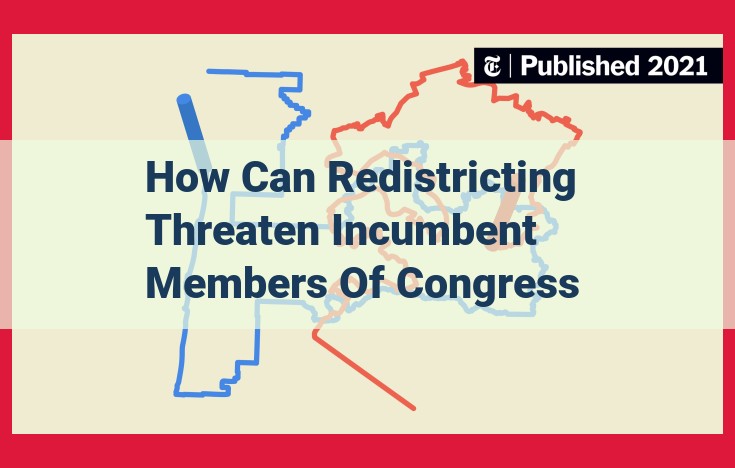In democracies, power lies with the people, who elect representatives or participate directly in decision-making. Majority rule is balanced by protections for minority rights. Independent judiciaries uphold justice. Freedom of speech and assembly are fundamental. In contrast, autocracies concentrate power in a single ruler, while oligarchies are ruled by a select few. Democracy emphasizes citizen participation, accountability, and the protection of individual rights, distinguishing it from non-democratic governments.
Understanding Democracy: The Foundation of Governance
In a world where governments shape our lives, it’s crucial to grasp the concept of democracy. At its core, democracy empowers citizens to have a voice in decision-making that affects their society. This concept has been the bedrock of countless societies throughout history and continues to inspire hope for a better future.
Three fundamental principles underpin democracy:
Majority Rule: The will of the majority prevails in decision-making. Majority rule ensures that the voices of the greater population are heard and respected. However, it also carries a responsibility to consider the interests of minority groups and to protect their rights.
Minority Rights: In a democratic society, the rights of minority groups must be safeguarded. This includes protections against discrimination, the right to participate in political processes, and the freedom to express their views.
Free Elections: Free and fair elections are the lifeblood of democracy. They provide citizens with an opportunity to choose their representatives, hold them accountable, and ensure that the government remains responsive to the will of the people.
By understanding these core principles, we can better appreciate the essence of democracy. It is not merely a system of government but a living, breathing expression of the will of the people.
Understanding the Nuances of Democratic Governments: A Journey through Different Forms
When we speak of democracy, we envision a system where the will of the people reigns supreme. But beneath this umbrella term lies a rich tapestry of democratic governments, each with its unique characteristics and approach to citizen participation.
Let’s delve into three primary forms of democratic governance:
Representative Democracy: The Voice of the People through Elected Officials
In a representative democracy, the people entrust elected officials with the power to make decisions on their behalf. These officials are accountable to their constituents through a system of free and fair elections. The premise is that elected representatives can best understand and advocate for the interests of their communities.
Direct Democracy: Empowering Citizens to Vote on Laws
In contrast, direct democracy gives citizens the direct power to vote on laws and policies. This form of governance allows for the most immediate and unfiltered expression of public will. However, it also raises questions about the potential for ‘tyranny of the majority‘ and the need to protect the rights of minority groups.
Participatory Democracy: Blending Citizen Involvement and Representation
Participatory democracy strikes a balance between representative and direct democracy. While decisions are ultimately made by elected officials, citizens have ample opportunity to participate in the decision-making process through various channels. This approach fosters a sense of community empowerment and can lead to more informed and responsive policies.
Elected Officials: The Voice of the People
In the tapestry of democratic governance, elected officials stand as the vibrant threads that connect the tapestry of the people to the fabric of power. These individuals, chosen through the sacred rite of elections, bear the solemn responsibility of representing the interests of their constituents, acting as their voices in the halls of government.
Their role is as multifaceted as a kaleidoscope. They are the conduits for the hopes, aspirations, and concerns of their constituents. They listen attentively to the stories of the everyday lives, the challenges faced, and the dreams pursued. With each encounter, they weave together a rich tapestry of insights, understanding the pulse of the community they serve.
As champions of their constituents’ interests, elected officials navigate the corridors of power, advocating tirelessly for policies and legislation that align with the will of the people. They engage in debates, scrutinize proposals, and cast votes, all guided by the unwavering compass of their constituents’ needs.
Beyond the walls of parliament, elected officials serve as ambassadors for their communities, connecting with constituents at town halls, community meetings, and on the streets. Through these interactions, they foster a vital feedback loop that ensures the government remains responsive and accountable to the people it serves.
The role of elected officials is not without its complexities. They must balance the diverse perspectives of their constituents, navigating the delicate terrain between competing interests. They must also withstand the pressures of political polarization, remaining steadfast in their commitment to the greater good.
Yet, amid these challenges, elected officials stand as beacons of representative democracy, reminding us that the power ultimately rests with the people they serve. They are the guardians of our collective voice, the embodiment of our aspirations, and the architects of our shared future.
Elections and Accountability: The Bedrock of Democratic Governance
In the intricate tapestry of democratic governance, elections stand as pillars of legitimacy and accountability. They provide citizens with the power to shape their destiny by electing representatives who will listen to their concerns and advocate for their interests.
Free and fair elections are the lifeblood of democracy. They ensure that all voices are heard, regardless of background or belief. Transparent voting systems, impartial electoral commissions, and the absence of voter suppression are essential safeguards for upholding the integrity of the electoral process.
To hold elected officials accountable for their actions, citizens rely on mechanisms such as recalls, term limits, and public scrutiny. These tools empower voters to replace representatives who fail to deliver on their promises or violate the public trust.
Recalls allow citizens to remove elected officials from office before their terms expire. This extreme measure serves as a potent deterrent against misconduct and corruption.
Term limits prevent individuals from holding office for indefinite periods, bringing in fresh perspectives and ensuring that power is not concentrated in the hands of a few.
Public scrutiny plays a vital role in holding elected officials accountable. A free and independent press can investigate wrongdoing, highlight broken promises, and hold those in power to account. Social media and citizen journalism have further amplified the power of public scrutiny, empowering citizens to demand transparency and integrity.
The Importance of Accountability
Accountability is the backbone of democratic governance. It prevents the abuse of power, fosters transparency, and ensures that representatives remain responsive to the will of the people.
Without accountability, elected officials may become disconnected from the concerns of their constituents, pursuing their own agendas at the expense of the public good. Corruption, cronyism, and complacency can flourish, undermining the very foundations of democracy.
It is the responsibility of citizens to engage in the electoral process, hold elected officials accountable, and safeguard the integrity of democratic institutions. By exercising their rights to vote, scrutinize, and participate, citizens can ensure that their government serves them, not the other way around.
Direct Democracy: Citizen Participation in Shaping Laws and Policies
Imagine a world where you, the average citizen, have the direct power to cast your vote on the laws and policies that affect your life. This is the essence of direct democracy, where the will of the people is expressed unfiltered and unmediated through direct citizen participation.
In direct democracy, citizens are not mere spectators, but active participants in the decision-making process. They gather in assemblies or through referendums and initiatives to propose, debate, and vote on laws and policies. This form of democracy empowers citizens to have a tangible say in shaping the direction of their society.
The process of direct democracy can vary depending on the specific system in place. Often, citizens form assemblies or councils where they discuss and propose laws. These proposals are then put to a vote, and the majority decision becomes binding. Alternatively, referendums allow citizens to vote directly on laws or policies without the need for an intermediary body.
One of the strengths of direct democracy is its ability to increase citizen engagement and promote a sense of ownership over the government’s actions. Citizens feel a greater connection to the political process and are more likely to participate in decision-making. Furthermore, direct democracy can foster transparency and accountability, as it is difficult for elected officials to ignore the expressed will of the people.
However, it is important to note that direct democracy has its challenges as well. One concern is the potential for the “tyranny of the majority,” where the majority can override the rights of minority groups. To prevent this, direct democracy systems often include safeguards such as constitutional protections for individual rights and balanced representation for minority groups.
Another challenge is the complexity of certain issues that may be difficult to understand and weigh in on for the average citizen. In such cases, delegate or representative systems may be necessary to provide the necessary expertise and deliberation.
Overall, direct democracy offers a powerful model for citizen participation and self-governance. By empowering citizens to directly shape the policies that govern their lives, it fosters a sense of ownership and promotes democratic values. However, it is important to ensure that appropriate safeguards are in place to protect minority rights and address the challenges of complexity and the “tyranny of the majority.”
Direct Democracy: The Power in the People’s Hands
Citizen Participation: The Heart of Direct Democracy
Direct democracy, a vibrant form of governance, places decision-making directly into the hands of citizens, empowering them to shape their own destiny. In this system, citizens actively participate in the lawmaking process, casting their votes on specific policies and issues. This deep level of citizen involvement fosters a sense of ownership and accountability.
Increased Engagement, Informed Decisions
A key advantage of direct democracy is its ability to increase citizen engagement in the political process. When people have a direct say in shaping their laws, they are more likely to stay informed about public affairs and participate in civic activities. This heightened engagement leads to more thoughtful and informed decisions that reflect the true will of the people.
Challenges and Risks
However, direct democracy also comes with its challenges. The most notable concern is the potential for tyranny of the majority, where the majority can impose its views on the minority without regard for their rights. Balancing majority rule with minority protection is a delicate task that requires careful consideration.
Furthermore, direct democracy can be inefficient and time-consuming. With every major decision requiring a vote of the entire citizenry, the process can become cumbersome and hinder timely governance. Also, the complexity of some issues may not be suited for direct voting by the general public.
Finding a Balance
Despite these challenges, direct democracy remains a powerful tool for empowering citizens and fostering a more responsive form of government. By striking a balance between majority rule and minority protection, and addressing the challenges of efficiency and complexity, societies can harness the benefits of direct democracy while mitigating its risks.
Citizen Involvement in Participatory Democracy: Empowering Voices from the Ground Up
In the realm of democratic governance, participatory democracy stands out as a vibrant and empowering model that invites citizens to actively shape their communities. Unlike traditional representative democracies, where elected officials make decisions on their behalf, participatory democracy places the power of decision-making directly into the hands of the people.
Through a diverse range of channels, citizens are given the opportunity to engage in meaningful discussions, cast their votes, and influence policies that directly impact their lives. Community meetings, citizen assemblies, and online forums serve as platforms for open dialogue and deliberation, ensuring that a plurality of voices is heard.
This decentralized approach fosters a sense of ownership and responsibility among citizens. They are no longer mere spectators but active participants in the democratic process. By actively engaging with their communities, individuals develop a deeper understanding of complex issues, fostering a more informed and engaged citizenry.
One striking example of participatory democracy in action is the co-production of public services. Instead of solely relying on government agencies, citizens are invited to collaborate with them in the delivery of services. This not only improves the effectiveness and efficiency of service provision but also builds trust between citizens and their government.
By empowering citizens to participate in decision-making, participatory democracy harnesses their collective wisdom and creativity. It breaks down traditional power structures, creating a more inclusive and representative form of governance. Through their active involvement, citizens become more invested in the well-being of their community, fostering a sense of belonging and _shared purpose*.
Community Empowerment: The Power of Participatory Democracy
In the realm of democratic governance, participatory democracy stands out as a model that embodies the spirit of community empowerment. Unlike traditional representative systems, where citizens elect officials to act on their behalf, participatory democracy invites citizens to actively engage in decision-making.
This approach fosters a sense of ownership and responsibility among citizens, as they have a direct say in shaping their community’s future. By participating in town hall meetings, serving on committees, or engaging in online forums, citizens can directly contribute to the policies and programs that affect their daily lives.
Participatory democracy empowers communities to tailor solutions to their unique needs. Whether it’s addressing local infrastructure issues, improving educational outcomes, or preserving cultural heritage, citizens have the agency to shape a future that resonates with their aspirations.
Furthermore, participatory democracy promotes a stronger sense of community. When citizens come together to deliberate and work towards common goals, bonds are forged and a collective identity emerges. This shared experience fosters a sense of belonging and encourages cooperation among neighbors.
By empowering citizens with a voice in decision-making, participatory democracy has the potential to revitalize communities and create thriving, inclusive neighborhoods. It allows for the diverse perspectives of all residents to be heard, leading to more equitable and responsive governance.
In essence, participatory democracy is more than just a form of government; it’s a transformative process that empowers citizens, strengthens communities, and ushers in an era of collective ownership over the future.
Majority Rule: The Balancing Act of Democracy
In democratic societies, the concept of majority rule plays a crucial role. It holds that decisions are made based on the preferences of the greater number of citizens. This principle upholds the idea of popular sovereignty, where the will of the people governs the affairs of the state.
Majority rule is often seen as a simple and efficient way to determine the course of action. By counting votes, the preference of the majority is clearly expressed. However, this seemingly straightforward concept poses a complex challenge: balancing the power of the majority with the rights of minorities.
In the pursuit of majority rule, it is essential to safeguard the interests of those who may hold different views. Majority rule must never become a tyranny of the majority, where dissenting voices are silenced or oppressed. To prevent such a scenario, democratic societies employ various mechanisms, such as constitutional protections, minority representation, and independent judiciaries.
Constitutions often guarantee fundamental rights that limit the power of the majority. Freedom of speech, assembly, and religion are enshrined as inviolable principles, ensuring that minorities are not silenced or persecuted for their beliefs.
Minority representation is another crucial safeguard. Electoral systems that promote proportional representation or create reserved seats for minority groups ensure that their voices are heard in decision-making bodies. By giving minorities a platform, it helps prevent the majority from making decisions that disproportionately burden or exclude them.
Ultimately, majority rule in a democracy is a delicate balancing act. It requires the power of the majority to be respected, while simultaneously protecting the rights and freedoms of minorities. Constitutional safeguards, minority representation, and independent judiciaries work together to ensure that the will of the majority does not become a tool for oppression but rather a force for progress that benefits all citizens.
Protecting Minority Groups: The Cornerstone of Democratic Governance
In a truly democratic society, the rights and well-being of all citizens, regardless of their background or beliefs, must be safeguarded. Minority groups, often vulnerable to discrimination and oppression, require special protections to ensure their voices are heard and their rights respected.
Constitutional Protections:
Many modern democracies enshrine the rights of minorities in their constitutions, guaranteeing them equal protection under the law, freedom of expression, and the right to participate fully in society. These constitutional safeguards provide a legal framework to prevent discrimination and ensure the fair treatment of all citizens.
Independent Institutions:
Independent institutions, such as human rights commissions and ombudspersons, play a crucial role in monitoring and investigating cases of discrimination. They provide avenues for grievances to be heard and ensure that justice is served for those who have been wronged.
Affirmative Action Programs:
Affirmative action programs are designed to address historical disparities and create a more level playing field for minority groups. These programs can include targeted policies to increase representation of minorities in education, employment, and other spheres of society.
Cultural Sensitivity:
Respecting the cultural diversity of minority groups is essential for true inclusion. Democratic governments have a responsibility to promote understanding and tolerance, and to create policies that accommodate the unique needs of different communities.
Citizen Engagement:
Citizens can play a vital role in protecting minority rights by speaking out against discrimination, supporting organizations that advocate for the rights of marginalized groups, and promoting dialogue and understanding among people from all backgrounds.
By implementing these safeguards and fostering a culture of inclusion and respect, democratic governments can ensure that all citizens feel valued and empowered to participate fully in society. Protecting minority rights is not only a moral imperative but also a cornerstone of stable and just democratic governance.
Judicial Impartiality: Ensuring Fair Trials and Protecting Individual Rights
In a democratic society, the independent judiciary stands as a cornerstone of justice, safeguarding fair trials and protecting the rights of every citizen. This impartial arbiter ensures that the rule of law prevails and that no individual is above it.
Judicial impartiality mandates that judges remain objective and impartial throughout their proceedings. They must not show bias towards any party involved in a case, treating both the accused and the prosecution equally. By adhering to this principle, judges uphold the integrity of the justice system and preserve its fairness.
Furthermore, an independent judiciary serves as a bulwark against abuse of power. Judges empowered to review laws and government actions for their constitutionality can strike down any that violate the fundamental rights of citizens. This judicial review ensures that the government remains accountable to the people it serves_.
Without an impartial judiciary, the administration of justice would be compromised. Biased judges can influence trial outcomes, undermining the search for truth and the pursuit of justice. Protecting judicial impartiality is essential for upholding the integrity of our democratic system and safeguarding the rights of all citizens.
Judicial Review: The Power of the Courts
In the delicate balance of power that defines a democratic society, the judiciary stands as an impartial guardian, entrusted with the weighty responsibility of ensuring that the government’s actions align with the highest law of the land. This power is known as judicial review.
Judicial review serves as a vital check on the other branches of government. Courts have the authority to examine both laws and government actions to determine their constitutionality. This means that they can strike down laws that violate the fundamental principles enshrined in the constitution, protecting citizens from potential overreach by the executive or legislative branches.
The power of judicial review is a cornerstone of a just and equitable society. It ensures that the government remains accountable to its citizens and that their rights are upheld. Courts act as the ultimate arbiters of the law, resolving disputes and safeguarding the delicate fabric of the democratic system.
Through judicial review, courts play a pivotal role in interpreting the constitution and applying its principles to real-world scenarios. This process helps to ensure that the government’s actions are not only lawful but also just and fair. It is a powerful tool that protects the rights of minorities, prevents tyranny, and upholds the rule of law.
Freedom of Speech and Assembly: Cornerstones of Democratic Societies
In democratic societies, freedom of speech and assembly stand as indispensable rights that safeguard our ability to express our thoughts, ideas, and beliefs. These fundamental freedoms are not merely abstract concepts but rather the lifeblood of a healthy and vibrant democracy.
Imagine a society where you could not voice your opinions without fear of retribution, where peaceful gatherings were forbidden, and the media was silenced. Such a society would be a breeding ground for oppression and tyranny, devoid of the essential elements that define a democratic state.
Freedom of speech empowers individuals to express their views, challenge authority, and hold the government accountable. It allows us to engage in open dialogue, exchange ideas, and foster intellectual growth. Through free speech, we can expose corruption, advocate for change, and work towards a more just and equitable society.
Freedom of assembly grants us the right to gather peacefully, to protest, to support causes that we believe in, and to connect with like-minded individuals. These gatherings are not simply about voicing our opinions but also about building solidarity and community. By exercising our right to assemble, we send a powerful message that our voices are united and that our demands for change cannot be ignored.
These freedoms, however, are not absolute. They come with certain responsibilities. We must use our right to free speech responsibly, avoiding hate speech, incitement to violence, and defamation. Similarly, we must exercise our right to assemble peacefully, without resorting to violence or disruption.
Protecting and upholding freedom of speech and assembly requires a commitment from both citizens and the government. Citizens must value these rights and use them wisely, while the government must safeguard them through strong laws and an independent judiciary.
In the tapestry of democratic societies, freedom of speech and assembly are threads that bind communities together and empower individuals to shape their own destiny. They are not simply rights to be enjoyed but essential foundations upon which democratic societies thrive and progress.
Limits and Responsibilities: Navigating the Boundaries of Freedom
In the tapestry of democracy, freedom of speech and assembly are vibrant threads that weave together a vibrant and open society. These fundamental rights provide a platform for diverse voices to be heard, opinions to be exchanged, and ideas to flourish. However, even in democratic societies, these freedoms are not absolute and come with inherent responsibilities.
One potential limit to freedom of speech is the need to protect against harmful content. Slander, libel, and incitement to violence are clear examples of speech that can harm individuals and society as a whole. Governments have a legitimate interest in preventing such content from causing undue harm by imposing reasonable restrictions.
Another important consideration is the impact of hate speech. While freedom of expression should not be stifled, hate speech can create a hostile and intolerant environment for marginalized communities. Some democratic societies have laws in place to prohibit hate speech that promotes discrimination or violence based on race, religion, sexual orientation, or other protected characteristics.
Responsibilities of citizens also play a crucial role in safeguarding freedom of speech and assembly. While individuals have the right to express their views, they must do so respectfully and without causing harm to others. Responsible speech involves refraining from hate speech, personal attacks, and knowingly spreading false or misleading information.
In exercising the right to assembly, citizens must balance their desire for free expression with the need to maintain public order. Peaceful protests and demonstrations are essential components of democratic societies, but they should not obstruct traffic, endanger public safety, or infringe on the rights of others.
Striking the right balance between freedom and responsibility is a delicate and ongoing task. By understanding the potential limits and adhering to the responsibilities that accompany these freedoms, citizens can ensure that the vibrant tapestry of democracy remains strong and inclusive.
Autocracy: Define autocracy and describe the characteristics of governments where power is concentrated in the hands of a single ruler.
Autocracy: The Shadow of Tyranny
In the realm of governance, autocracy stands as a stark contrast to the principles of democracy. It paints a grim picture of power concentrated in the iron grip of a single ruler, casting a long shadow over the aspirations of freedom and self-determination.
An autocrat wields absolute authority, unchecked by the mechanisms of representation or accountability. The will of the individual reigns supreme, silencing the voices of those who dare to dissent. Citizens are reduced to mere subjects, stripped of their fundamental rights and denied a say in their own destiny.
Autocratic regimes can manifest in various forms, with dictators, monarchs, or military juntas seizing control. Power is inherited, usurped, or maintained through fear and oppression. The rule of law is often a mere illusion, replaced by the whims and dictates of the sovereign.
The consequences of autocracy are dire. Economic stagnation, social unrest, and human rights abuses are rife in these societies. Progress is stifled, and the hopes and dreams of citizens are crushed under the weight of tyranny.
History is replete with examples of the horrors perpetrated under autocratic rule. From the brutal reign of Stalin in the Soviet Union to the oppressive regime of Pol Pot in Cambodia, the scars of autocracy run deep, leaving lasting wounds on the fabric of humanity.
In the face of such darkness, it is imperative to raise our voices against autocracy. We must cherish and defend the principles of democracy, ensuring that the power to govern rests with the people, not with a single individual. Only through the collective will of the governed can we build a just and equitable society where the voices of all are heard and the rights of all are protected.
**Understanding the Spectrum of Governments: From Democracy to Oligarchy**
Democracy is a form of government where power is vested in the people. It is a complex system that can take many forms, from direct democracy to representative democracy.
In a direct democracy, citizens directly participate in making decisions. They vote on laws and policies, and they hold their elected officials accountable. In a representative democracy, citizens elect representatives to make decisions on their behalf. These representatives are responsible for passing laws and managing the government.
Oligarchy is a form of government where power is concentrated in the hands of a small group of people. This group may be composed of wealthy individuals, military leaders, or religious leaders. Oligarchies can be very stable, but they are often corrupt and oppressive.
There are many different forms of oligarchy. One common form is rule by an elite few. This type of oligarchy is often seen in countries where the wealthy have a great deal of control over the government. Another common form of oligarchy is rule by a military junta. This type of oligarchy occurs when the military takes control of the government.
Oligarchies are often characterized by a lack of accountability. The ruling elite is not typically elected by the people, and they are not subject to the same checks and balances that are found in democratic governments. This can lead to corruption and abuse of power.
Oligarchies can also be very oppressive. The ruling elite often uses its power to suppress dissent and to maintain its grip on power. This can lead to a loss of freedom and opportunity for the people.
Oligarchy is a dangerous form of government. It is important to be aware of the signs of oligarchy and to take steps to prevent it from taking hold.




